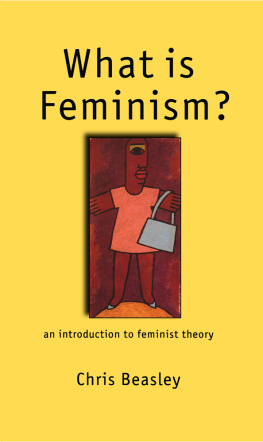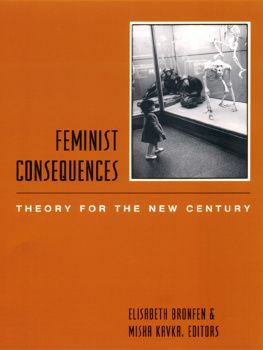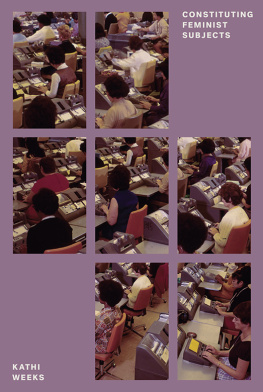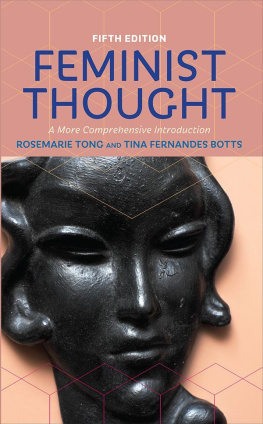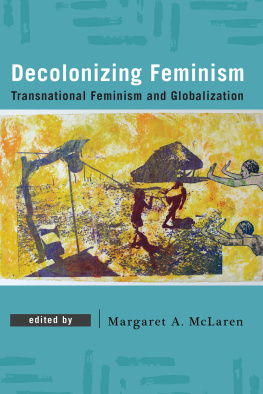Published by State University of New York Press, Albany
2019 State University of New York
All rights reserved
Printed in the United States of America
No part of this book may be used or reproduced in any manner whatsoever without written permission. No part of this book may be stored in a retrieval system or transmitted in any form or by any means including electronic, electrostatic, magnetic tape, mechanical, photocopying, recording, or otherwise without the prior permission in writing of the publisher.
For information, contact State University of New York Press, Albany, NY
www.sunypress.edu
Library of Congress Cataloging-in-Publication Data
Names: Johnson, Roberta, 1942 author.
Title: Major concepts in Spanish feminist theory / Roberta Johnson.
Description: New York : State University of New York Press, [2019] | Series: SUNY series in Latin American and Iberian thought and culture | Includes bibliographical references and index.
Identifiers: LCCN 2018021841 | ISBN 9781438473697 (hardcover : alk. paper) | ISBN 9781438473710 (ebook)
Subjects: LCSH: FeminismSpain. | Womens rightsSpain. | WomenEmploymentSpain. | Sex roleSpain.
Classification: LCC HQ1692 .J64 2019 | DDC 305.420946dc23
LC record available at https://lccn.loc.gov/2018021841
10 9 8 7 6 5 4 3 2 1
I dedicate this book to my husband, Ricardo Quinones,
who showed great forbearance during the many years it took
to write it, and to Ben Quinones, Laurel, Sarah, and Cecilia,
who never tired of asking me how the work was coming along.
Introduction
The Concepts and the Women Who Formulated Them
I s Spain different? Many have argued that Spains geographical position between Europe and Africa and its 800-year-domination by Arabs (7111492) have molded the country in distinctive ways. Its literature and philosophy seldom appear in major surveys and anthologies of Western cultural production. Such is the case with Spanish feminist theory. Mary Nash points out, for example, that el feminismo igualitario, basado en el principio de la igualdad entre hombres y mujeres y el ejercicio de derechos individuales, no representa la fundamentacin terica exclusiva del feminismo espaol sino que coexiste con un fuerte arraigo de un feminismo que se legitimiza a partir del presupuesto de la diferencia de gnero y del reconocimiento de roles sociales distintos de hombres y mujeres (Experiencia y aprendizaje 158) [egalitarian feminism, based on the principle of equality between men and women and the exercise of individual rights, does not represent the exclusive foundation of Spanish feminism but coexists with a strong basis of a feminism that is legitimized on the presupposition of sexual difference and the recognition of different social roles for men and women]. And Maria Aurlia Capmany notes that Spanish feminists, unlike their Anglo-American sisters, did not form an ideological front. Campany points out that each region in Spain had different social, economic, and political circumstances that demanded different solutions (see De profesin mujer 2324). ( A New History of Iberian Feminisms takes this situation into account.) In Spain, late eighteenth- and early nineteenth-century liberalism (especially the notion of representative government) of other Western countries such as France and England was weak. The ancien rgime was prolonged in a medieval landholding system, in the top-down socioeconomic and political hierarchy, and in the relatively small and slow-growing bourgeoisie. Only a few wealthy men had the right to vote. The general lack of confidence in electoral democracy did not inspire women to place the vote at the center of their agenda for change. Rather, education became the motivating force, education that would provide women the means to work and gain economic independence from men. Mary Nash also points to another factor in Spanish society that steered early Spanish feminism in directions other than suffrageel claro predominio del discurso de la domesticidad (160) [the clear preponderance of a discourse of domesticity], which forms the basis of Spanish feminism and shapes its course. Understanding this fundamental difference between Spanish feminism and that of other Western countries is important to contemporary debates between difference feminists and equality feminists that have characterized recent Spanish feminist theory.
A number of studies exist on French, American, English, and Italian feminist thought, but there is only one monograph on Spanish feminist disc ourseEstrella Cibreiras Palabra de mujer: Hacia la reinvindicacin y contextualizacin del discurso feminista espaol [Womens word: Towards the vindication and contextualization of Spanish feminist discourse]. Cibreiras is a valuable initiation into the topic, but it is written in Spanish and includes commentary on both essays and fictional works. The many histories of women and histories of feminism in Spain are likewise written in Spanish and have not been translated. Catherine Daviess Feminist Writers in Spain Since 1900: From Political Strategy to Personal Inquiry, a useful survey that treats Carmen de Burgos, Margarita Nelken, Clara Campoamor, Federica Montseny, Carmen Laforet, Carmen Martn Gaite, Lidia Falcn, Monsterrat Roig, Esther Tusquets, and Rosa Montero, includes both essayists and novelists. Spanish Women Writers and the Essay: Gender, Politics, and the Self , edited by Kathleen M. Glenn and Mercedes Mazquiarn de Rodrguez, contains in-depth considerations of specific women writers who wrote essays, although not all of them on feminist topics. The volume includes Emilia Pardo Bazn, Carmen de Burgos, Mara Martnez Sierra, Margarita Nelken, Rosa Chacel, Mara Zambrano, Carmen Martn Gaite, Lidia Falcn, Montserrat Roig, Soledad Purtolas, and Rosa Montero. Constructing Spanish Womanhood: Female Identity in Modern Spain , edited by Victoria Lore Enders and Pamela Beth Radcliff, contains a number of useful essays on significant topics related to Spanish feminism from the early nineteenth to the . Most recently, Recovering the Spanish Feminist Tradition , edited by Lisa Vollendorf for the Modern Language Association of America, marks another milestone, as it contains important analyses of specific authors of all literary genres from the Renaissance forward. Lastly, I mention two volumes I have coedited and that I hope the present volume complements Antologa del pensamiento feminista espaol 17002012 (with Maite Zubiaurre) [Anthology of Spanish feminist thought 17002012] and A New History of Iberian Feminisms (with Silvia Bermdez). The first supplies a sampling of texts of Spanish feminism across three centuries, and the second chronicles the history of Spanish and Portuguese feminist thinking with special emphasis on the particularities of feminist thought in the key Spanish territoriesthe Basque Country, Castile, Catalonia, and Galicia.
While these studies move chronologically from author to author, Major Concepts in Spanish Feminist Theory is organized around six central concepts that mark the focus of its chapters: (1)
The six concepts are intertwined, but pairs of conceptssolitude and personality, work and social class, and equality and differencebear particular affinities, in part because they share the same historical time frame. Work and social class were important topics of Spanish feminist thinking in the 1920s and 1930s, when leftist political parties were gaining ground in Spain leading up to the Second Republic and during the Republics brief rule. Equality and difference feminism, while they have precedents in earlier Spanish feminist thinking, are especially linked to the democratic era. These two concepts, in fact, became identified with particular Spanish feminist schools of thought that engaged in open and sometimes hostile public debate, a debate that continues to smolder today (See my article The Concept of Gender Equality in Constitutional Spain). The concepts of solitude and personality can be found throughout the modern history of Spanish feminist theory. The importance of these concepts in Spanish feminist theory can be attributed to the fact that Spanish women were not traditionally considered persons in their own right, but rather as appendages of the men in their livesfathers, brothers, husbands, sons. Given that certain writers focused on one or another concept, they are treated only in the chapters of their particular focus. Such is the case, for example, of Rosa Chacel and Maria Zambrano in the chapters on solitude and personality. In addition, since these writers are more philosophically inclined, their approaches to feminism are less sociological than others treated in later chapters. The books themes are arranged in a roughly chronological format (1700 to the present). Thus early mid-twentieth-century authors, such as Zambrano and Chacel, are less likely to appear in later chapters, especially the chapters on difference and equality that come to the fore in democratic Spain (1975present).


